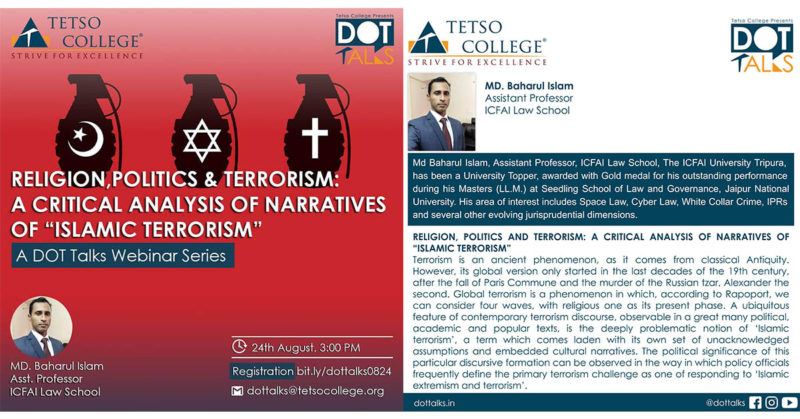Terrorism is an ancient phenomenon, as it comes from classical Antiquity. However, its global version only started in the last decades of the 19th century, after the fall of Paris Commune and the murder of the Russian tzar, Alexander the second. Global terrorism is a phenomenon in which, according to Rapoport, we can consider four waves, with religious one as its present phase. A ubiquitous feature of contemporary terrorism discourse, observable in a great many political, academic and popular texts, is the deeply problematic notion of ‘Islamic terrorism’, a term which comes laden with its own set of unacknowledged assumptions and embedded cultural narratives. The political significance of this particular discursive formation can be observed in the way in which policy officials frequently define the primary terrorism challenge as one of responding to ‘Islamic extremism and terrorism’. While polemics is still shadowing the internationally accepted definition, the word “Terrorism” becomes more controversial when it is paralleled with “Islam”. The Islamic Terrorism discourse is more likely to be an elusive concept if not a Fata Morgana. Its very existence appears as a real entity but its form can hardly be described. It would be always be problematic to posterize such a terrible notion as “terrorism” and put it side by side with a noble concept as in “Islam”. “Islamic Terrorism” has become a trending topic in global politics and academic discourses in the first decade of the millennium. A war on terrorism is not likely to end terrorism. There are the existences of several periods of global terrorism, but it seeks to prove that the designations “religious terrorist” and “Islamic terrorism” are not entirely correct and they represent myths. Besides, it shows that these myths are based on two fallacies– the clash of civilizations, and the unity of Islam world – and they are the origin of serious problems, not only in the western world but also in the Islamic countries refusing to follow the Islamic law. It is a ubiquitous problem because when a terrorist group is defeated it continues “to shift away from a centralized command and control structure toward a more diffused model”. To solve the problem of terrorism requires addressing its roots: internal constraints, dictatorships sponsored by the West and the underdevelopment that result from neo-liberal globalization. Thus, it is the contention of this talk that there is a need to challenge the discursive construction of ‘Islamic Terrorism’ as a universal existential threat, provoking reflection upon the normative consequences of the language, ideographic framing, and knowledge production conjured by the term.
Md Baharul Islam, Assistant Professor, ICFAI Law School, The ICFAI University Tripura, has been a University Topper, awarded with Gold medal for his outstanding performance during his Masters (LL.M.) at Seedling School of Law and Governance, Jaipur National University. His area of interest includes Space Law, Cyber Law, White Collar Crime, IPRs and several other evolving jurisprudential dimensions. He is an active academician crediting a plethora of Articles and Research Papers (Total 17) in a handful prestigious National as well as International Journals, apart from book chapters (Total 2) and a book “IPRs in Space Activities & Satellite Remote Sensing” authored by him. In course of pursuing his academic profession, he played a pivotal role in establishment of the N.J.Y. Centre for Post Graduate Legal Research and he also framed one year as well as two year LL.M and ODL LL.M Course Curriculum. Apart from his teaching in UG and PG courses, he successfully supervised quite a few LL.M Dissertations (Total 6). As a prolific academician, he had presented a good number of research papers (Total 12) in various national as well as international seminars and conferences, and he credited to convene several such seminars. Apart from his busy schedules of student-teacher activities like Placement I/C, Legal Aid I/C, legal awareness and interaction based programs, he also manages to be editorial board member of some Journals (Total 3). Apart from this, he has been in a strong academic mission of boundary-less legal knowledge dissemination among academic professionals, law faculties, research scholars and law students during the lockdown of COVID- 19 crises. He convened the Legal Webinar Series 2020 (Total 9 webinars) and has been convening a One Week Online Faculty Development Program. He has a deep thrust for dynamic legal discourses haunting him to join various seminars, webinars, workshops and Faculty Development Program conducted by various national legal educational institutions. He has even represented The ICFAI University Tripura at National as well as International Level, apart from playing various significant roles in creating inter-institutional relations with several national legal educational institutions.
Date: 24th August 2020
Time: 3:00 PM
Registration: bit.ly/dottalks0824

